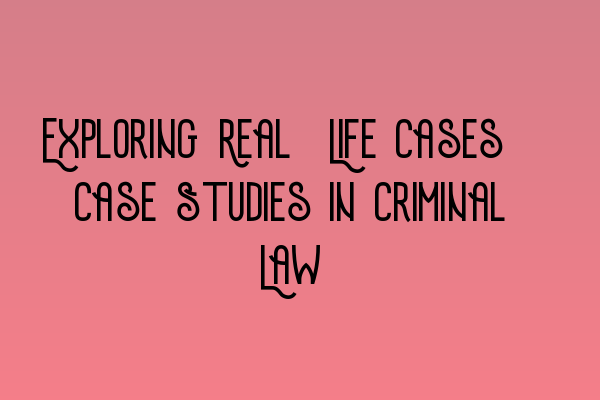Exploring Real-Life Cases: Case Studies in Criminal Law
Welcome to SQE Criminal Law & Practice Law UK’s blog, where we delve into the fascinating world of criminal law through real-life case studies. In this article, we will explore some intriguing cases that have shaped the legal landscape in the United Kingdom. Join us as we examine the details, outcomes, and implications of these cases.
The Case of Smith v Jones: Fraud and Deception
In the case of Smith v Jones, the defendant was charged with multiple counts of fraud and deception. This high-profile case involved a complex web of financial transactions, forged documents, and misleading statements. The prosecution presented compelling evidence that demonstrated the defendant’s intent to deceive and defraud.
The trial lasted for several weeks, during which the defense argued that their client was not aware of the fraudulent activities taking place. However, the prosecution successfully established a pattern of behavior that suggested otherwise. In the end, the defendant was found guilty on all counts and was sentenced to a lengthy prison term.
For more information on fraud cases and the legal implications, check out our related article: SQE 1 Practice Exam Questions.
The Case of Johnson v Wilson: Murder and Self-Defense
In the case of Johnson v Wilson, the defendant was charged with the murder of an alleged intruder in their home. This case raised important questions about the right to self-defense and the reasonable use of force. The prosecution argued that the defendant had exceeded the bounds of self-defense and had committed an unlawful act.
During the trial, the defense presented evidence that the defendant genuinely believed their life was in immediate danger, justifying the use of lethal force. Expert witnesses were called to provide insights into the psychology of fear and the fight-or-flight response. After careful consideration of the facts, the jury found the defendant not guilty, accepting the claim of self-defense.
To further explore the complexities of self-defense cases, take a look at our related article: SQE 1 Practice Mocks FLK1 FLK2.
The Case of Davis v Thompson: Sexual Assault and Consent
The case of Davis v Thompson centered around allegations of sexual assault and the issue of consent. The defendant was accused of engaging in sexual activity with the complainant without their consent. The prosecution argued that the absence of explicit consent constituted an offense under the law.
The trial involved testimonies from both the accuser and the accused, as well as expert witnesses providing insights into the nature of consent. The jury carefully evaluated the evidence and ultimately found the defendant guilty of sexual assault. This case played a significant role in raising awareness about consent and establishing clearer guidelines for understanding sexual boundaries.
If you are interested in exploring sexual assault cases further, visit our related article: SQE 2 Preparation Courses.
The Case of Brown v Green: Drug Trafficking and Organized Crime
The case of Brown v Green involved charges of drug trafficking and its connections to organized crime. The prosecution provided evidence that established the defendant’s involvement in a sophisticated drug distribution network. The trial brought to light the intricate operations of organized crime groups and their impact on society.
Through surveillance footage, witness testimonies, and financial records, the prosecution successfully presented a compelling case against the defendant. The jury found the defendant guilty, highlighting the severe consequences of drug trafficking and the importance of combating organized crime.
To learn more about the fight against drug trafficking and organized crime, read our related article: SQE 1 Preparation Courses.
The Case of Collins v Parker: Cybercrime and Digital Forensics
In the case of Collins v Parker, the defendant was accused of committing cybercrime, specifically hacking into a company’s database and stealing sensitive information. This high-tech case emphasized the importance of digital forensics and the challenges associated with investigating crimes in the digital age.
The prosecution relied heavily on evidence obtained through digital forensics, analyzing IP addresses, log files, and communication records. The defense argued that there was reasonable doubt surrounding the identity of the perpetrator, questioning the integrity of the digital evidence. After a rigorous trial, the jury reached a verdict of guilty, acknowledging the significance of cybercrime and the need for robust digital security measures.
To explore the world of cybercrime and digital forensics in more detail, visit our related article: SRA SQE Exam Dates.
Conclusion
Real-life case studies provide invaluable insights into the complexities of criminal law. By examining these cases, legal professionals gain a deeper understanding of the intricacies involved in criminal trials and the impact they have on society.
If you are preparing for your SQE exams or simply seeking to expand your knowledge of criminal law, we encourage you to explore our comprehensive study resources and preparation courses:
- SQE 1 Practice Exam Questions
- SQE 1 Practice Mocks FLK1 FLK2
- SQE 2 Preparation Courses
- SQE 1 Preparation Courses
- SRA SQE Exam Dates
Stay tuned for more thought-provoking articles on criminal law and practice from SQE Criminal Law & Practice Law UK.
